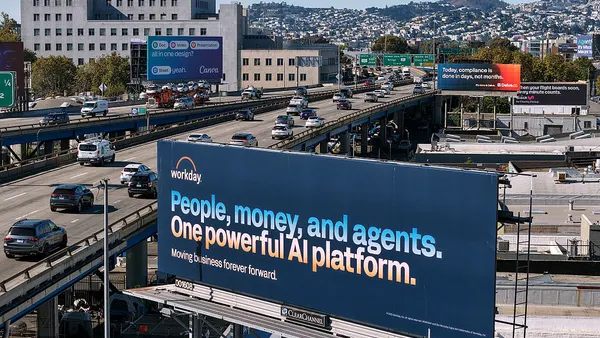Dive Brief:
- Five percent of Coinbase’s employees, around 60 people, have left the cryptocurrency company after CEO Brian Armstrong’s Sept. 27 announcement calling for a move to an "apolitical culture" and identification as a "mission-focused company," according to an Oct. 8 post on its company blog.
- Armstrong said he offered a "generous exit package" to any employee uninterested in continuing under the new guidelines, which included directives to "focus minimally on causes not directly related to the mission," such as public policy outside of crypto or "broader societal issues." Armstrong said: “We don’t advocate for any particular causes or candidates internally that are unrelated to our mission, because it is a distraction from our mission. Even if we all agree something is a problem, we may not all agree on the solution."
- Armstrong included this information and commentary in internal emails as well, including the data on people leaving the company, according to his blog post. To that piece, he added that "the final number will be a little higher," as some employees are still negotiating an exit and that "[i]t was reassuring to see that people from under-represented groups at Coinbase have not taken the exit package in numbers disproportionate to the overall population."
Dive Insight:
Coinbase’s announcement drew a lot of attention, continuing a conversation that has created confusion for employers’ since at least the 2016 election. A 2019 survey from Clutch found that 45% of workers aged 18-34 said they believe their organizations should not "clarify whether employees can use their social media to express political views while working;" many of that age group also said they believe in the importance of working for an organization that shares their political views.
Still, Armstrong and other leaders have a business case for doing what they can to curb political conflict at work. A February Gartner survey found that 36% of employees say they avoid co-workers because of political disagreements and 47% report being distracted by the election. A study by Challenger, Gray & Christmas Inc. found that the distraction of last year’s impeachment hearings may have cost employers billions of dollars in lost productivity.
"There's some incentive in my view for employers to think carefully about making clear to everybody that maybe work isn't the best place to have intense political or social discussions, although it's also difficult to stop," said Randy Coffey, a partner at Fisher Phillips, in a conversation with HR Dive in August.
Many companies have issued guidelines attempting to handle this challenge, including Google, which urged its employees to “[a]void conversations that are disruptive to the workplace or otherwise violate Google's workplace policies."
Employment attorneys that spoke with HR Dive pointed to Title VII of the Civil Rights Act of 1964 and the National Labor Relations Act for guidance on the rights of employers and employees with respect to political speech at work. They said anti-discrimination laws still apply and employers can absolutely protect workers’ right to a civil workplace.
"It may very well be that it's a losing battle to stop social or political discussions at work, but you can remind your employees that the company's policies relating to non-discrimination and respectful workplaces still apply," Coffey said. "Those things can get out of hand and become the basis of a hostile work environment claim," he added. "I think, frankly, that's the bigger risk."














